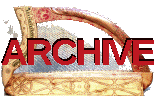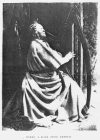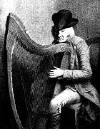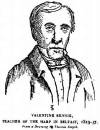
|
As we might expect from a high-status musical tradition that lasted over a thousand years, there is a very large number of people who have been involved with it. This is just a provisional list of old harpers, a work in progress. I was assembling it for my own use, when I suddenly thought that my long-suffering readers might like to have access to it as well. If you see a gap, or know something that I don’t, please feel free to send it in.
These people were all players of the Gaelic harp before it became extinct in the 19th century. For some present-day revival harpers see the clarsach.net artist page.

Darby Scott

William Archdeacon
Diarmait Albanach (fl. 1621 - 1634), also known as Darby Scott. Harper at the Danish royal court. He is depicted in a painting by Reinhold Timm.
read more: web article by Keith Sanger at clarsach.net
Éamon Albanach (early 17th century). Possibly the same person as Ned Scott, harper to Lord Chichester.
William Archdeacon (1685-1759). A wealthy Irish aristocrat who emigrated to Ghent. Portrait at the JMI.
Richard Barrett (fl.c. 1590) Harper to Sir John Perrot (who was Lord Deputy of Ireland between 1584 and 1588). (Donnelly 2003)
William Barry (fl. c.1620) blind, harper to Lord David Barry, Viscount Barrymore. (Fletcher 2001 p. 407, 576)
Dick Barry (? - 1683) possibly from Kinsale, co. Cork. Irish harper in the household of Sir Robert Southwell, Kings Weston, nr. Bristol. (Donnelly 1984)
William Bathe (1564 - 1614) of Rathfarnham Castle, co. Dublin, "known... for his skill and his late device of the new harp which he presented to her majesty" Elizabeth I. (Donnelly 2000)
Charles Berreen attended the Granard Ball, 1781. (Bunting 1840)
Daniel Black (c.1716 - 1796) Blind harper and singer from Co. Derry, attended the Belfast harpers' meeting in 1792. He chiefly frequented the house of a Mr. Heymand, Glendaragh, near Antrim. He gave Bunting a few songs and tunes, and also is listed as a contributor to the list of techniques and terminology in Bunting's 1840 volume. (Fox 1911)

Charles Byrne
Charles Byrne (c.1718 - c.1810) from co. Leitrim. Also called Berreen Attended the Belfast harpers' meeting, 1792, and aparrently also the Granard balls. He gave Bunting a number of songs and airs. His portrait was sketched by Miss O’Reilly of Scarva in 1810. He was sighted and in his youth had acted as a guide to his blind uncle, who may have been the Charles Byrne known by Carolan. (Fox 1911)
Charles Byrne (early 18th c.) "An itinerant harper... that Carolan detested very much" (Memoirs of Athur O'Neill) (Fox 1911)

Patrick Byrne
Patrick Byrne (1794 - 1863) from Kingscourt, co. Cavan. Student at the Belfast Harp Society in 1821. Toured throughout Britain and Ireland, and was photographed in Edinburgh in 1845.
Read More...
Rev. Charles Bunworth (? - c.1770) of Baltdaniel, co. Cork, rector of Buttevant. Owned and played the Bunworth harp. "A fine performer on the harp" with an "extensive knowledge of Irish music", he "...was most kind and hospitable to the harpers who went the round of country houses during the middle of the eighteenth century. One by one these minstrels died off, leaving...[to Bunworth]... the harps they had played upon for so long... At the time of Bunworth's death... there were fifteen of these harps deposited in the loft... Unfortunately the family removed to Cork for a temporary change, and before their return the whole of the fifteen harps, no doubt many of them extremely interesting and valuable specimens, were broken up for firewood by the servant who had been left in charge of the house" (Armstrong 1904)

Carolan
Turlough Carolan (1670 - 1738), from Nobber, co. Westmeath. Harper, poet and singer. He wrote songs for a number of patrons, which were often set to traditional tunes, e.g. “Seabhac na hÉirne” (“the Hawk of Ballyshannon”); he also composed instrumental music, e.g. “Carolan’s Concerto”.
Read More...
John Carolan (18th c.) Turlough's son. He was patronised by Patrick Delaney (1686 - 1768) and his wife Mary (? - 1788), who set up a fund of £1600 to allow the young Carolan to revive and recover all of his father's compositions. Gráinne Yeats suggests that the Carolan Fragment in the National Library might be the result of this work. But John left Ireland for London, taking with him the wife of annother man from Ballymahon, co. Longford, his father's harp, and the remainder of the £1600. (Fox 1911)
William Carr (1777 - post 1792) attended the Belfast harpers' meeting, 1792, where he played "The Dawning of the Day". (Bunting 1840)
Patrick Connor taught Denis O'Hampsey
Thomas Connellan (c. 1640 - post 1717) from Cloonmahon, co. Sligo. Brother of William. He travelled in Scotland and was made a Burgess of the City of Edinburgh in c. 1717. Songs attributed to him include "Molly St. George", "The Dawning of the Day", "Bonny Jean". He is also credited with composing the popular Scottish tunes "The Battle of Killiecrankie" and "Lochaber no More". (O Baoill 1971) Book by Kathleen Loughnane
William Connellan (c. 1645 - c. 1700) from Cloonmahon, co. Sligo. Brother of Thomas. Songs attributed to him include "Molly MacAlpine", "Lady Iveagh", "Saely Kelly". (Bunting 1840)
Cruise (late 16th century) was blind, and was harper to O'Brein, Earl of Thormond (Zoilomastix)
Lachlann Dall, see Lachlann Mac Ionmhuinn
Hugh Dornan (fl.1811) Student at the Belfast Harp Society in 1811. ( McClelland 1975 )
Jerome Duigenan (?1710 - ?) from Co. Leitrim, sighted, an excellent Greek and Latin scholar, and a charming performer on the harp. He was harper to Colonel Jones of Drumshambo, the MP for Co. Leitrim. There is a lovely anecdote about Colonel Jones being in Dublin for the Parliament, and there was an unnamed Welsh harper there with an English nobleman. The Colonel said he had a better harper, and summonsed Duigenan, who appeared dressed in the traditional cáiteach cape and hat made of rushes or straw. There was a contest in the House of Commons in Dublin, between the Welsh harper and Duigenan, and the latter won and was presented with a hat full of guineas. (Arthur O’Neill, Memoirs, DOSC p.159)
James Duncan (1747 - c. 1800) from co. Down. Taught the harp by Harry FitzSimmons. Arthur O'Neill in his Memoirs tells us that he learned the harp as part of his general education, and bacame an itinerant to cover the costs of an expensive family lawsuit. He played modern music rather than ancient Irish airs. He attended the Belfast harpers' meeting in 1792. (Bunting 1840)
Thady Elliott (1725 - ?) Arthur O'Neill, in his Memoirs, tells a very amusing story of Thady, who "treated me very affectionately, I being but young, and he middle-aged, and universally known as a Harper". Thady was apparently regularly employed to play the harp in church as part of the liturgy; "A humorous fellow took Thady to a public house and promised to give him a gallon of whiskey if he would rattle up Planxty Connor at the time of the Elevation".
Lewis Evans (pre-1618 - 1666), also known as Lewis Williams, was taught Irish harp by Philip Squire and was appointed to the English Royal "lutes and voices" in 1633. (Holman 1987, Donnelly 2000)
Charles Fanning (c.1736 - c.1800) attended the Belfast harpers' meeting, 1792. (Bunting 1840)
Loughlin Fanning taught Denis O'Hampsey
Harry Fitzsimon, father of Harry junior
Harry Fitzsimon junior, son of Harry
Hugh Frazer (fl. 1821) Student at the Belfast Harp Society in 1821. ( McClelland 1975 )
William Gorman (c. 1796 - ) from Ballymena. Student at the Belfast Harp Society in 1811. "Immediately dismissed... as incapable by nature of learning the harp" ( McClelland 1975 )
John Garragher taught Denis O'Hampsey
Hamilton Graham (fl. 1821) Student at the Belfast Harp Society in 1821. ( McClelland 1975 )
Alexander Grant of Shewglie (near Inverness) (c. 1675 - 1746). Fiddler, piper and harper. May have been responsible for the song "Mairi Nighean Dheorsa" or "Grant of Sheuglie's contest betwixt his Violin, Pipe and Harp". (Sanger and Kinnaird 1992)
Thomas Hanna (fl. 1821) from Antrim. Student at the Belfast Harp Society in 1821. ( McClelland 1975 )
Heffernan of London
Hugh Higgins (1737 - 1796) attended the Belfast harpers' meeting, 1792. (Bunting 1840)
James Jackson Student of Valentine Rennie. Master of the Belfast Harp Society after 1837. (McClelland 1975)
Michael Keane in Arthur O'Neill's memoirs (Annals p.169), from Mayo. Went to America with Dobbs.
Owen Keenan taught Arthur O'Neill
Thady Keenan, fl. early 18th century, credited with the song 'Lord Mayo' by Bunting, Walker & Thompson.
Patrick Kerr attended the Granard Ball, 1781.
Patrick Linden taught Patrick Quin.
Cornelius Lyons (c. 1680 - c. 1750) Harper to the Earl of Antrim. He composed the tune "Miss Hamilton", and was especialy noted for his variations to "Eibhlín a Rún", "An Chúileann" and others.
Raghnall Mac Ailein Òig (1662-1741), also known as Ranald MacDonald of Morar, or of Cross; his name is also spelt Ronald, or Raonuill. He is best known as a piper, and composer of pibroch, but since the 19th century he has traditionally been said to have also played fiddle and clarsach.
Read More...
Jane McArthur (fl. 1821) from Ballycastle. Student at the Belfast Harp Society in 1821. ( McClelland 1975 )
James M'Cauley (fl. 1853). A news article in the Anglo-Celt of Cavan, Sept 8th 1853, says: ‘ASSAULT UPON A BLINK IRISH HARPER, AND BREAKING HIS HARP.
James M;CAULEY, a blind Irish Harper, v. Michael KEONE
The defendant, a blacksmith, was convicted and sentenced to six weeks' imprisonment at hard labour, for having, on the 24th August, assaulted complainant, and broken his harp, in Cootehill. It appeared in evidence that the defendant was drunk, and requested the complainant to play some favourite tune of his, which he declined to do, whereupon he assaulted him and broke his harp, which he received from the Belfast Irish Harp Institution, in which he was taught as dark or blind pupil. The defendant was fined one pound for the assault and one pound for the injury done to the harp, with costs.’ (from irelandoldnews.com, their bad spelling!)
Edward McBride (c. 1792 - ?) from Omagh. Student at the Belfast Harp Society in 1811. Master until 1823. ( McClelland 1975 )
Patrick McCloskey (fl. 1821) from Banbridge. Student at the Belfast Harp Society in 1821. ( McClelland 1975 )
Giollapatrick Mac Cridan (fl. 1621) Harper to Sir John Fitzedmond Fitzgerald of Cloyne; named on the Cloyne harp
Dermot McCridan (fl. 1621) Harper to Sir John Fitzedmond Fitzgerald of Cloyne; named on the Cloyne harp.
Cormack McDermott (? - 1618), possibly from co. Roscommon. Harper to Sir Robert Cecil, 1st Earl of Salisbury from the late 1590s; joined the Royal Musick of Elizabeth I in 1602-3. Eight compositions survive attributed to him in 17th Century sources, all of them courtly dance tunes in polyphonic settings. (Holman 1987, Donnelly 1986)
listen: Ann Heymann plays "Cormac's Alman"
McDermott Roe (c. 1650 - ?) taught Carolan?
Edward McDermott Roe attended the Granard Ball, 1782.
Murdoch MacDonald ( - c.1739) From Coll, Scotland. Also known as Murdoch Clarsair. A student of Roderick Morison, subsequently studied in Ireland.(Sanger and Kinnaird 1992)
Ranald MacDonald of Cross, see Raghnall Mac Ailein Òig
Jago McFlaherty (fl. 1682) Irish harper to the Duke and Duchess of Hamilton, Brodick Castle, Perthshire, in 1682. (Donnelly 1984)
Patrick McGrath (c. 1797 - ) from Dundalk. Student at the Belfast Harp Society in 1811. ( McClelland 1975 )
Duncan McIndeor, ( - 1694), harper to Campbell of Auchinbreck (Sanger 2009)
Lachlann Mac Ionmhuinn (MacKinnon) (? - c. 1721-7) from Scotland. Also known as Lachlann Dall. Famously the subject of Sileas na Ceapaich's lament:
Slàn a chaoidh le ceòl na clàrsaich
Ona ghlac am bàs thu, Lachlainn;...
(Sanger and Kinnaird 1992)
Read More: Book of Poems and Songs by Sileas MacDonald
James McMolaghan (c. 1798 - ) from Lifford. Blind, a student at the Belfast Harp Society in 1811. ( McClelland 1975 )
In 1812 James was on tour with another student of the Society, and stopped at the house of a Protestant activist. There he was converted from his Catholicism, after which he is reported to have said:
|
“
I must go to America, or to England. I cannot stay in this kingdom. The Catholic gentry are the principal patrons of the Irish harp; to them I have been taught to look for support, and I have experienced their bounty: but my present views cut off all my expectations from that quarter. Each of them has his chaplain; some from devotion, but most because it is respectable to keep one. In those families, each morning is ushered in by the celebration of mass, and the assistance of the harp is esteemed the revival of a part of the splendor and solemnity of their religion; but I dare not now do it; I could no longer countenance such an abomination. „ | |
William McMurchy (c.1700 - c.1778) from Kintyre, Scotland. Poet, piper, fiddler, harper. He wrote his poems and other material into notebooks some of which survive. (Sanger and Kinnaird 1992)
McShannon Harpers to the Lords of the Isles in Kintyre during the 16th and 17th centuries (Sanger 1991)
Patrick Maguire attended the Granard Ball, 1781.
Catherine Martin attended the Granard Ball, 1782.
Alexander Menzies (? - 1705), from Perthshire, Scotland. A wealthy harper, little else is known of him. (Sanger and Kinnaird 1992)
Rose Mooney (1740 - c.1798/1800) A student of Thady Eliott. She was third prize winner at the Granard and Belfast harpers’ meetings, 1781-2 & 1792. A number of her tunes were noted by Bunting. What is thought to be her harp is preserved in the National Museum of Ireland. Her maid was a heavy drinker and reportedly pawned the harp for drink money. Arthur O’Neill speculated that they died of drink when French soldiers raided a liqueur store in 1798, but Bunting marks tunes as collected from her in 1800. (Bunting 1840)
Read more...
Roderick Morison (c.1656 - c.1714) from Bragar, Lewis, Scotland. Also known as Ruaidhri Mac Mhuirich, or Mac Gille Mhoire, or Rory Dall. In this last respect he has for centuries been confused with Ruaidhri Dall Ó Catháin (late 16th C - c.1650), the “Irish Rory Dall”. He began studying the harp in Scotland, and also visited Ireland to study. For many years he was harper and poet to the MacLeods of Dunvegan, Skye, Scotland. A number of his poems survive. Also, there are some instrumental harp tunes attributed to “Rory Dall”, and there has been much debate over which Rory Dall they were composed by. It’s my suspicion that Roderick Morison was primarily a poet and singer who set his songs to old airs, and accompanied himself on harp, rather than an instrumental composer, but there is no definite proof.
Read More...
Dominic Mungan (1715 - ?) whispering, classical.
Patrick Murney (?c.1820s? - post 1882) Explained stringing in July 1882 (Laverty 1903); earlier his name appears (c. 1840) in letters from Dr. James MacDonnell where he is described as MacDonnell's "little harper" (Fox 1911). I assume he learned to play at the Belfast Harp Society although MacDonnell paid for his harp to be made. Two portraits of him by Lady Dufferin show Murney in 1838 as a young boy playing his big Egan wire-strung early Irish harp. (Reproduced in Charlotte Milligan Fox (ed. Sara C. Lanier), Annals of the Irish Harpers, Ardrigh Books 2013, plates 10 & 11.)
William Murphy (fl.1839) Student at the Belfast Harp Society in 1839. ( McClelland 1975 )
David Murphy (c. 1670 - c. 1746) from co. Tyrone, harper to lord Mayo. The song "Tiarna Mhaigh Eó" ("Lord Mayo") is attributed to him. He toured in England and the Continent, and was a bitter rival of Carolan. (Yeats 1992)
Mr. Murphy Famousest man in the world
Bríghid Ní Chatháin taught Denis O'Hampsey (Bunting 1840)
Donnchadh Ó Catháin (fl.1617) was recruited (as Donatus O'Chaine) in London in 1617, for service in the Polish royal court. (Donnelly 2000)
Echlin O'Cathain (1720/29 - c.1790) or O'Kane, from Coleraine, co. Derry. A student of Cornelius Lyons. He dictated his autobiography in 1779. Travelled in the low countries, France and Spain. He was often in the West coast of Scotland. He sang and accompanied himself on the harp; he arranged traditional tunes and also played Correlli and other European music. Some of his repertory is preserved in the Maclean-Clephane mss. (Sanger and Kinnaird 1992)
Daniel Duff O'Cahill (c. 1580 - c.1660)
Ruaidhri Dall Ó Catháin (late 16th C - c.1650). An Irish gentleman harper from near Coleraine in the North of Ireland. he went to Scotland perhaps around 1600 and spent most if not all of the rest of his life there, moving from one great house to the next. He seems to have been especially patronised in the Perthshire area. He composed a number of fine instrumental pieces, including Da Mihi Manum, Port Atholl, Port Lennox, Port Ballangowne, Cumha Peathar Ruaidhri, Suipeir Tighearna Leòid, and Is Eagal Leam am Bàs (though the last three are sometimes claimed instead for Roderick Morison). (O Baoill 1971)
Read More...
Thaddeus O'Coffey
Cearbhall Ó Dálaigh (17th century) AKA Gerald O'Daly. The song "Eibhlín a Rún" is attributed to him.
Dominick O'Donnell, harper of Foxford. Supplied tunes to Bunting in the late 18th century (Moloney, O'Sullivan). More
Naoise O'Duigenan (fl. 1st half of 16th century). "Nuisius Odugennanus musicus pro avorum nostrum tempore musicorum lyricorum prodigium ex somno repente evasit" (Zoilomastix)
Hugh O'Hagan (? - c.1880) from Co. Louth. Spent his last years in Dundalk; his harp was one of the Hewson Society ones, presumably presented to him by the Society as it also bore his own name. (Co Louth Arch Soc)

O'Hampsey
Denis O'Hampsey (1695 - 1807), also known as Denis Hempson, from Magilligan, co. Derry. Attended the Belfast harpers’ meeting, 1792. He was the only one there to still play with the old fingernail techniques, and many important tunes played by him are preserved in Edward Bunting’s manuscript notebooks. He played on the Downhill harp.
Read More...
Echlin O'Kane: see Echlin O'Cathain.
William O'Houlahan or O'Habrahan (d. early 16th Century). This man, probably harper to the Butler Earls of Ormond, is known only from his tomb in Jerpoint Abbey, co. Waterford. The tomb is very eroded, hence the ambiguity in the name.
Read More: web article by Keith Sanger

Arthur O'Neill (1734 - 1816) attended the Belfast harpers' meeting, 1792. (Bunting 1840) More...
Edward O'Neill (fl.1811) Student at the Belfast Harp Society in 1811. ( McClelland 1975 )
Hugh O'Neill taught Arthur O'Neill
James O'Neill (c. 1794 - ) from Dungannon. Student at the Belfast Harp Society in 1811. "Immediately dismissed... as incapable by nature of learning the harp" ( McClelland 1975 )
Patrick O'Neill (c. 1798 - ) from near Dungannon. Student at the Belfast Harp Society in 1811. ( McClelland 1975 )
Bridget O'Reilly (fl.1811) from Virginia. Student at the Belfast Harp Society in 1811. ( McClelland 1975 )
In the Anglo-Celt, published in Cavan, Aug 4th 1848, is a notice which may refer to her: ‘There resides in this county, not far from Virginia, an old woman upwards of seventy years of age, who in her early days played upon this instrument, to the delight of thousands, and who has hereditary claims upon us beside; she is now in a destitute state, but with the pride of her race has hitherto refused to solicit elymosnyary aid. We are not at liberty to mention her name, as we have not got authority to that effect, but if any kind individuals think well of assisting this relic of better times the publisher of the ANGLO-CELT will receive their contributions and transmit them to her for whom they are intended.’ (from irelandoldnews.com, their bad spelling!)
Charles O'Reilly (fl. 1601-2) described in Danish records as "Carolus Oralii, an English harper", played at the Danish royal court in 1601-2. (Donnelly 2000)
Myles O'Reilly (c. 1635 - ?) from Killincarra, co. Cavan. The Scottish air "Lochaber no more" was attributed to him by 18th century harpers.
Samuel Patrick (1819-Feb 1888) Student at the Belfast Harp Society in 1840 (?) Entered the school in 1834. Played at venues in Dublin and then Belfast, including the Botanic Garden, the Queen's Island and the Ormean Park. ( McClelland 1975, also Belfast Newsletter 22688, March 23 1888 )
Nicholas Dall Pierse (c. 1561 - 1653) (Zoilomastix) (Pierse 1973)
Plunkett (fl. c. 1590) harper to Sir William Fitzwilliam, Lord Deputy of Ireland. (Fletcher 2001 p.422, Donnelly 1984)

Patrick Quin
Patrick Quin (c. 1745 - post 1809) was one of the youngest harpers at the the Belfast meeting in 1792. He also played the violin. Bunting collected many tunes from him, including all three of the surviving beginners’ tunes. Quin taught at the Irish Harp Society’s Dublin school from its beginning in 1809 until 1812, and performed in Dublin from 1809. Quin owned and played the Castle Otway Harp.
Read More...

Valentine
Rennie
Valentine Rennie (1795/97 - 1837) from Cushendall , co. Antrim. Student at the Belfast Harp Society in 1811; 'Professor' of the Harp School 1823 - 1837.
read more: web article by Keith Sanger at clarsach.net
John Robertson (d. c. 1630) of Lude, Perthshire. The Robertsons of Lude owned both the Queen Mary and the Lamont harps. John Robertson was the last to play on them, and his repertory was published in the later 18th century. More info on John Robertson's music...
Robert Robertson (testament 1713), of Straloch, (?Perthshire). (Sanger 2009)
Darby Scott see Diarmait Albanach.
Henry Scott (c. 1550 - c. 1650) Brother of John.
John Scott (c. 1550 -c. 1650) Brother of Henry.
Ned Scott (fl. c. 1621) Harper to "Lord Chichester" (Sir Arthur Chichester, Lord Deputy of Ireland 1605-15). Possibly the same person as Éamon Albanach. (Fletcher 2001 p.407, 577.)
Philip Squire (fl. 1618 - c.1630) an English multi-instrumentalist who was taught Irish harp by Cormack MacDermott and succeeded him in the English Royal Musick in 1618. (Donnelly 2000)
Matthew Wall (c.1810-1876) Sent by the Belfast Harp Society to New Brunswick in 1830. (McClelland 1975)
From Le Journal de Quebec
(Quebec City), 17 june 1843: "On Wednesday Mr. Wall gave a single recital, as he had announced.
The harp is an ungrateful instrument by nature, since despite the
artist's skill, it nevertheless emitted some hard metallic sounds." (sent by Peter Wilson)
More...
John Wallace Student at the Belfast Harp Society in 1811. ( McClelland 1975 )
Abraham Wilkinson (c. 1798 - ) from Ballymoney. Student at the Belfast Harp Society in 1811. ( McClelland 1975 )
Lewis Williams, see Lewis Evans.